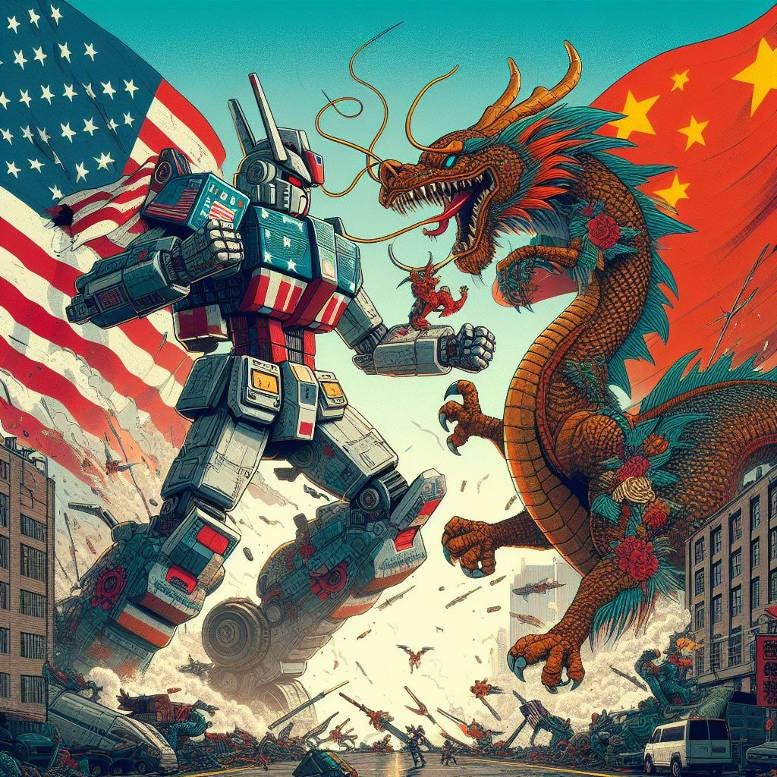Market Pulse: Between Two Giants
In 8 minutes, let's discuss how the market is stuck in the middle of a tug of war between two global economic superpowers.
In 8 minutes, let's discuss how the market is stuck in the middle of a tug of war between two global economic superpowers.
The US stock market is in a precarious spot.
The world is in turmoil and so many different forces are pushing and pulling the market around.
In this issue, we’ll review the major forces driving the market right now and give a point of view on where we’re headed next.
To start, here’s a “lay of the land” for markets today:
China down, but minor recovery:
The Chinese stock market has been steeped in a major bear market since last year and is staging a mild rebound right now after Xi Jinping met with a slew of top US executives last week at the China Development Forum.
Bitcoin and Gold up:
China’s pain is Bitcoin’s gain and the latter has staged a massive rally since January 2023 with price almost quadrupling.
Gold has been doing very well recently with price increasing over 20% since the October lows.
Oil up:
Oil prices have surged since Russia stopped gasoline exports on March 1st.
Western central banks want to loosen monetary policy:
Two weeks ago, the Swiss Central Bank cut its policy interest rate by 25 basis points in a surprise move. This made it the first major Western central bank to start cutting interest rates in this cycle of global monetary policy tightening.
The European Central Bank recently lowered their inflation expectations and signaled a high chance of a rate cut in June.
The Bank of England is also preparing for a June rate cut.
Last but not least, the Federal Reserve also signaled a possible rate cut in June in addition to an impending tapering of Quantitative Tightening.
The US is in a populist election year:
As mentioned in a recent newsletter issue, the US is in an election with high populism and high inflation.
Historically, the US stock market has done very well during such election years as the US government juices up fiscal policy to meet the demands of populism.
The US government is on the cusp of a fiscal crisis:
Total US debt issuance is set to double this year from last year.
The US government has no plan to quell its uncontrollably growing budget and this spending glut is happening during a time of high interest rates.
Without an austerity plan or a way to significantly increase government revenues, interest expenses will take up more and more of the budget until a disastrous debt spiral happens.
The crux of the issue is that the government is stuck between a rock and a hard place: government spending must be wrestled under control before interest expenses become untenable but how do you get an elected government to cut spending in a time with so much populism?
The situation is dire enough that BlackRock CEO Larry Fink recently joined JP Morgan CEO Jamie Dimon, Fed Chair Jerome Powell, and legendary investor Stanley Drunkenmiller in sounding the alarm on the US’s deteriorating fiscal situation.
Despite all this, the US stock market has remained anti-fragile, having risen almost 30% since November.
Here’s what we think is going on.
💡 Narrative #1: China
The Chinese stock market has been steeped in a major bear market for the last three years.
Although its stock market is relatively small, the decline of the market is the just tip of the iceberg and a symptom of a deep and pervasive global sentiment to pull capital out of the country.
The large and prolonged fall of China’s stock market suggests that this isn’t just the product of run-of-the-mill sino-skepticism and the situation on-the-ground has substantially changed in the past few years.
We think the top drivers of this ongoing capital flight from China are:
Taiwan.
The Chinese government has continuously signaled gradual escalations in its plan to reunify with the island nation, from its outward messaging to internal social and financial policy changes to significant military preparations.
The continued crackdown on “excessive” wealth in China.
CNBC contributor Michelle Caruso-Cabrera had this to say after talking to an American CEO who recently met with Xi Jinping during the China Development Forum last week.
“After spending nearly a week there speaking with the leadership and members of the business community, this CEO said there was no indication the country is is backing away from centralizing the economy.”
“He said wealthy Chinese are fearful and selling items that are seen as ostentatious, such as private jets, "because its dangerous to be rich in China." He added that they are trying to get their money out of the country.”
Xi Jinping again stressed the importance of Taiwan reunification: “-that the US should not try to hinder China's growth -Taiwan is a red line and that China doesn't interfere with other countries' borders, so other countries shouldn't try to interfere with theirs -that nuclear war would destroy humanity and we should never go there”
The sudden controlled demolition of China’s real estate industry, the Chinese population’s main store of wealth.
The dramatic collapse of Evergrande is the face of an ongoing large-scale and controlled demolition of China’s highly leveraged real estate sector.
The problem is that real estate is the only reliable store of wealth for the Chinese people. Unlike in the US, where stocks serve as a long-term store of wealth alongside real estate, the Chinese view their own stock market with great suspicion.
By forcefully cooling down the real estate market without giving the Chinese people an alternative store of wealth, there’s not surprisingly a lot of “wealth angst” in China right now.
So China has been experiencing a dramatic rise in capital flight, and for good reasons, but what are the broad implications of this?
We see three major implications:
Capital out of China is capital into the US:
We have recently been discussing macroeconomics in the context of broad-based liquidity, for example, with how the Bank of Japan’s money-printing is increasing liquidity in the US financial system, and we think capital flight out of China is another piece of this global liquidity puzzle.
When capital leaves China, it needs to go somewhere, and the world’s top destination for capital is the United States.
As such, we think that the US stock market’s spectacular performance in the past year despite historically tight monetary conditions is partly due to a net flow of global investment capital from China to the United States.
Cryptocurrencies:
What’s the best way to take capital out of a country with tight capital controls? Cryptocurrencies.
We think that the cryptocurrency market’s remarkable growth over the past year was partly the result of capital flight out of China.
We think that the rest of the market is catching on to this correlation, with the major China tech ETF KWEB recently trading inversely to Bitcoin and the S&P 500.
Gearing up for conflict
As mentioned before, so many signs in China point to impending military aggression. The unraveling of the other two major geopolitical conflicts in the world and the US government's worsening fiscal situation also make this a very opportune time for China to act.
Just yesterday, Xi Jinping discussed Taiwan with Joe Biden over the phone:
"President Xi Jinping stressed that the Taiwan question is the first red line that must not be crossed in China-U.S. relations. In the face of “Taiwan independence” separatist activities and external encouragement and support for them, China is not going to sit on its hands. He urged the U.S. side to translate President Biden’s commitment of not supporting “Taiwan independence” into concrete actions.
So what happens to markets if the situation escalates and something bad happens?
First of all, an important canary in the coal mine for impending military conflict is a steady rise in the prices of cryptocurrencies, commodities, and precious metals.
Then, when the conflict does happen, the outcome for markets is obvious: a major market crash with the semiconductor sector hit especially hard.
💡 Narrative #2: Populist Election Year
Let’s bring our attention back to the US.
The overall narrative here is straightforward.
The country is in the midst of a populist election year and we think this will subsume most other stock market narratives this year.
As mentioned in a recent newsletter issue, the US stock market has historically performed spectacularly well during populist election years and this isn’t surprising. When the People yell for more, the Government relents, especially when something as high stakes as a presidential election is at play.
So what about inflation and the government’s problematic fiscal situation?
We think the Fed and the US Treasury will try to avoid opening this can of worms until after the election, while keeping liquidity ample in the financial system in the meantime.
Importantly, this doesn’t mean the market will be stable or keep rising. History is littered with examples of the market or inflation forcing the central bank’s/government’s hand.
💡 Narrative #3: Energy and Inflation
Soaring energy prices is the third major tectonic force driving the market this year and it’s probably the most significant given its immediacy coupled with a surprising lack of discourse.






